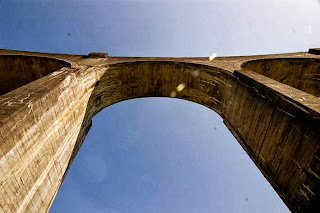You might not be hearing before that; there is a special bridge made for
pedestrians, and cyclists in the Dutch City of Eindhoven. The Hovenring
cable stayed circular bridge diameter is 72 meters is suspended
from a 70-meter pylon situated at the center of the roundabout by 24
cables and seems to float over a big novel junction for motorized
traffic. The bridge is with thin decks and conspicuous lighting, purely
amazing landmark in the city. When in night, the
slender bike ring lit from below to further enhance that floating
effect, similar to flying saucer. The steel bridge hoovers over the
Heerbaan-Meerenakkerweg intersection. The bridge is impressive pylon
marking the entrance way to the cities of Eindhoven and
Veldhoven. There is a level crossing which is local housing estate
inquiring changing in order to cope with the growing traffic. As
Eindhoven City Council refrains from cyclist underpasses and didn’t want
a level crossing roundabout either, they asked Dutch
bridge specialist IPV Delft to consider at possible solutions. A
circular cable-stayed bridge soon appeared to be the right option.
Constructing the circle bridge proved to be more difficult than
expectation, because Hovenring Bridge was opened for public
in Dec 2011, but closed due to suspension cables vibrated too much, and
it has to closed for safety point of view. After some adjustment it was
finally opened for public on June 29, 2012.
A compendium of interesting places, hidden wonders, Beautiful Places, strange travel destination, tourist attractions.
Tuesday, 7 January 2014
Sunday, 5 January 2014
Glenfinnan Viaduct the West Highland Line¸ Scotland
The beautiful Glenfinnan Viaduct is a
railway viaduct built between July 1897 and Oct 1898 on the West
Highland Line in Glenfinnan, Lochaber, Highland, Scotland. The project
cost was around £18,904. It is situated at the top of Loch Shiel in the
West Highlands of Scotland, and has been used as location in several
films and television series. This project is considered great
engineering work of largest concrete without reinforcing built by Sir
Robert McAlpine. Sir Robert McAlpine took on a massive civil engineering
task with the building of the Mallaig Extension of the West Highland
Line from Fort William west to Mallaig, though that was not the
originally intended destination. The 21-Arch single track viaduct forms
part of the Mallaig extension of the West Highland Railway which was
constructed in between 1897 till 1901, which is also built entirely of
concrete.
It is a popular tourist event in the
area, and the viaduct is one of the major attractions of the line, the
lovely viaduct contains of 21 arches, each spanning 15m and has a
maximum height of 30m proffering remarkable views down Lochaber’s Loch
Shiel. These kinds of projects always offers great scarifications of
labour work, and during construction a cart-horse and driver were killed
when they fell into one of the piers while dumping their load, and were
buried in the concrete. In the latest research has shown that the sad
incident happened at Loch Nan Uamh Viaduct, further down the line, near
Arisaig, and the driver survived. Memorial plaques are at the latter
viaduct and at Glenfinnan Station Museum.
The West Highland railway line connects
Fort William and Mallaig, and was a vital vein for the local fishing
industry and the highlands economy in general, which suffered extremely
after the Highland Clearances of the 1800s. The line is used by
passenger trains operated by ScotRail between Glasgow Queen Street and
Mallaig, usually diesel multiple units. The viaduct project was not
often appreciated, and several authorities criticized when this viaduct
was first proposed. According to them; it would be prove a monstrosity,
enough in ugliness to take away all the charm and beauty of natural
scenes. Some would endorse this opinion now and wholeheartedly agreed.
Sunday, 29 December 2013
Luoping Spring Seasons Yellow Flowers
Luoping is a little countryside in eastern Yunnan situated
about 228 KM north east of Kunming China. In the spring, Luoping turns into an
ocean of flowers. It is located close to the border of Yunnan with Guizhou and
Guangxi provinces. The town was frequently ignored by visitor passing through
the region until recently. It had become a Mecca for photographers, who flock
to this little county every early spring to capture the wonderful “sea of
yellow” of blooming rapeseed flowers. The magnificent photos in turn, draw more
and more tourists to this beautiful rural photographic haven. It's that time of
the year that the rapeseed flowers or canola are in full bloom. Photographers
flock to this beautiful destination to capture the stunning sight rolling hills
surrounded by bright yellow flowers as far as the eye can see. The blooming
buds fill the air with the refreshing smell of spring that not only is a magnet
for human, but also bees. The attractiveness of the yellow sea of rapeseed
flowers swaying in slow swirling waves in the gentle breeze is a sight that is
out of this world. It is also the period for beekeeping and honey processing.
Beekeepers set up base in tents surrounded by the rapeseed farms every spring
to keep bees and harvest their honey- the bees feed on the rapeseed flowers.
Hence the majority rapeseed farms are also abuzz with bees in the spring and
can be a small irritating. These beekeepers move on to other locations within
Luoping after the rapeseed season, using wildflowers as feedstock for their
bees.
Subscribe to:
Comments (Atom)






















































